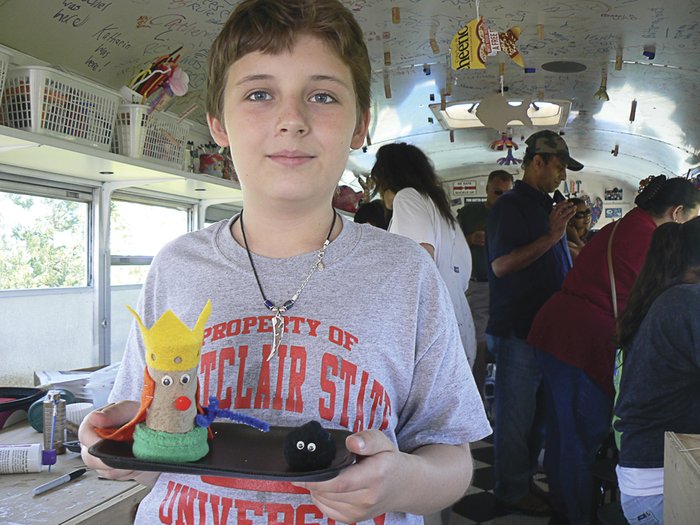The Secaucus Green Festival held last Saturday, June 16, educated the local community about living a sustainable life through organic, recycled, and/or compostable products, water conservation, and pollution reduction.
While some residents held a blue-tongued lizard and found out how bats help keep the mosquito population down, others kayaked on the Hackensack River or took their kids onto the Fun Art Bus to create eco-friendly crafts.
In its second year, the festival is one of a number of actions the mayor and Town Council have taken to qualify for Sustainable Jersey state certification.
But has the message of ‘being green’ sunk in?
Many residents talked about recycling, while others mentioned lowering energy usage, driving less, and/or re-using materials, when asked about sustainability. A number of people mentioned the importance of protecting the environment for future generations. And a few parents said that it was important for their children to learn about the planet through events like the festival.
“Today people are starting to get it.” – Captain Bill Sheehan
____________
At a micro-level, the Green Festival offered a similar step.
Earth for future generations
“It is more like a mindset,” said David Nicholson from the Mahwah Environmental Volunteers Organization. A college student at Northwestern University, he handed out information and free recycling bins during the festival. “It is about how [people’s] actions affect the planet as well as the local community.”
Sustainable development meets the needs of the present without compromising the ability of future generations to meet their own needs, according to the United Nations.
“Today people are starting to get it,” said Captain Bill Sheehan of the Hackensack Riverkeeper.
His team helped run the kayak station at the festival. “It means being able to conduct business and live your life in a way that won’t detract from the next generation’s ability to live their life.”
At the individual level
Mary Ellen Gilpin, Director of Environmental Programs at the Hudson County Improvement Authority (HCIA) said that recycling was better understood than sustainability, which she said, “means something different to everybody.”
She sat at the HCIA table, which had materials about how to reduce, reuse, and recycle waste as well as takeaways like crayons made out of soybeans.
“It means re-using things over and over again,” said Alex Savage from the HCIA.
Resident Michele Mazzer caught on to the idea of reusing materials. She carried her personal items in a bag made of plastic bags that from afar looked like a hand-woven beach bag. Mazzer joined up with her friend Janice Swift, who came up with the idea to crochet plastic bags into items such as purses and wine cozies. The two started the company Pretty Trashy Bags.
“This is sustainability,” said Mayor Michael Gonnelli as he held up a plate made out of fallen Arecanut palm tree leaves, which is 100 percent compostable. The plate was one of the items available at the Art of Living Foundation table. For Gonnelli sustainability is about raising consciousness.
Environmental Chairperson Amanda Nesheiwat defined sustainability as something that went beyond recycling waste to how individuals think about their fundamental needs versus what they want or desire.
“It is about doing without single-use items and recycling what you really need in life,” said Nesheiwat.
Hands-on connections for kids
For kids, learning took place via hands-on experience with nature and animals, crafts, and a magic act.
Ed Valdez’s 5-year-old daughter Sitara made a vase out of a plastic water bottle and pipe cleaners on the Fun Art Bus. Valdez said that he wants his daughter to understand that we only have one world and that we need to appreciate it. For him being green is about being “mindful.”
“We need to be aware of the things we use that will protect the environment for the next generation,” said Secaucus resident Jocelyn Torres. A pair of falcons named Olga and Raiden fascinated her 8-year-old daughters Emily and Amy, who squatted in front of the birds in a staring contest. The eight-week-old Saker Falcons will soon go to work in a blueberry field in Connecticut to chase away birds that eat the berries on a farm that has decided to stop using pesticides, according to falconer Erik Swanson.
Adriana Rambay Fernández may be reached at afernandez@hudsonreporter.com.
